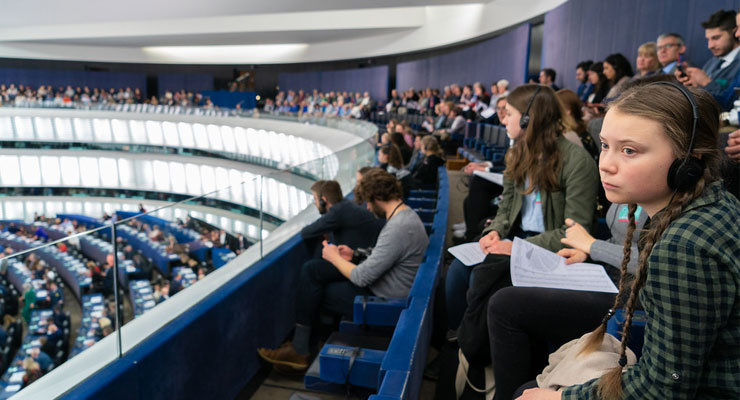
You might have heard of Extinction Rebellion (“E.R.”), a splashy British climate change protest group who cause all sorts of kerfuffles like protests blocking London’s streets and super-gluing their asses to the glass of the British Parliament viewers gallery. They’re the Al Qaida of the climate push minus flying planes into buildings, presumably due to the environmental costs of all that air travel and the explosions. Their methods are nearly as attention-seeking and almost as counterproductive.
They’re allied with Swedish high school truant and activist Greta Thunberg and their juvenile hooliganism is merely performative and much less useful than voting for environmental issues as your correspondent noted in a recent article. In an American context, by the way, “voting for the environment” does not mean voting for the Green Party for a variety of complicated political reasons, but rather voting solidly Democrat. Greta arrives in New York any day now by boat for a climate conference so you’ll hear more about her soon.
E.R.’s latest performative stunt calls for a “mass psychedelic protest for the decriminalization of drugs” as well as their main agenda: the climate crisis, with an emphasis on the latter. This “tripping to save the world” is the kind of thing that gives environmentalism, sane drug policy and psychedelics a bad name. They’re linked, as we’ll see.
You can see the logic (screwy as it is) if you consider a few strange facts about psychedelics noted in these pages by your correspondent. Part of that strangeness is that unlike other drugs psychedelics bend what in almost all other circumstances are stable, life long personality traits, sometimes for years. One such trait psychedelics tend to alter – one of the “Big Five” – is openness [to new experiences] and there is hard science for this happening to many users in scientific studies. It has been hypothesized that the mechanism for action therein is the connections and re-connections psychedelics form in the brain while under the influence. This involves alpha and theta waves which zip around in our heads, not the neurotransmitters psychedelics also employ.
Often resulting in an experience likened to a “childlike” state these psychedelic-formed connections force a re-examination of the world mimicking, later in life, the way we make sense of things when we’re very young. Thus, the tripper sees things anew. The point of E.R.”s action is presumably to “re-set” mass consciousness and political opinions to being more open to the implications of climate change.
Another thing E.R. is perhaps hoping to profit from is a weird but well-documented phenomenon wherein studies so many participants reported “an increased appreciation of nature” after taking psychedelics that researchers started including it in their questionnaires. Its an inexplicable phenomenon since the neural co-relates of “appreciation of nature” isn’t really nailed down which is probably why the questions weren’t asked in the first place. One possibility is that nature is beautiful to the human senses and psychedelics tend to enhance our experience of beauty: simple as that.
This fits, in a weird way, when you consider the “hippy” experience of the 1960s where ecological awareness went hand in hand with the psychedelic lifestyle. Earth Day’s founding in 1970 and the environmental movement owe much to the popularization of LSD in the 1960s and anecdotally many recreational users of LSD and psilocybin will chat on and on (and on) about the wonders of nature, post-trip.
The problems with E.R.’s scheme of “mass psychedelic protest” are manifold, however. A shared appreciation of nature and a slightly more open mind do not in any way suggest that that appreciation will lead to any pro-environmental action. Stunning as a forest or beach can be while tripping, it doesn’t move the electoral needle one iota.
Further, with several thousand legitimate scientific studies performed before 1970 and in the last decade the field of psychedelic medicine is a serious business which has the potential to revolutionize the way we treat mental illness: to have it co-opted by a fringe and fanatic cult of “greenism” can only serve to tarnish legitimate research and even damage public opinion regarding citizens’ peaceful psychedelic recreation. Its the “with friends like these” argument which also holds for Alexandria Ocasio Cortez’s (AOC) recent positive comments about psychedelics: great at first blush but such divisive proponents don’t do a cause much good in the big picture.
Further, a large percentage of E.R.’s fanatic minions are minors, a fact which makes a lot of sense as young people with their half-formed prefrontal cortices have an immature sense of proportion and little common sense: just like E.R. Psychedelic drugs are most assuredly not for children so E.R.’s plan has disaster for everybody written all over it.
So as well as inconveniencing the middle class of London by pointless and counter-productive protests, engaging in emotional blackmail by putting weirdly fierce, mentally fragile moppet Greta Thunberg out front of their sideshow, this wildly self-indulgent mass psychedelic protest is the new nadir from E.R. The climate crisis is real – stunts like this can only damage the acceptance of psychedelic medicine as well as the climate crisis.
Leave a Reply